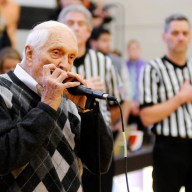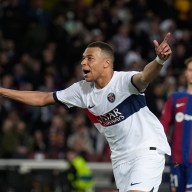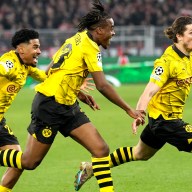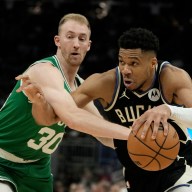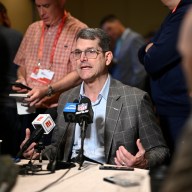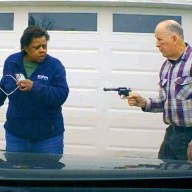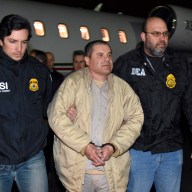MONTREAL — When the UFC 97 pre-fight news conference broke up, Chuck Liddell quietly peered into his phone as reporters rushed the other fighters on the dais. The Iceman was literally left to his own devices.
A second wave eventually turned its attention to Liddell, but the delay was noticeable — and perhaps understandable. Three losses in four fights will do that to you.
The former light-heavyweight champion will shed no tears at missing out on reporters’ questions but he does wonder about the length of some people’s memories.
“You can go from a fight where you’re the best in the world to where you lose and you’re a nobody, you’re done,” he noted wistfully in an earlier interview.
At 39, Liddell still loves to fight. When he retires, he wants to go out as a champion and so he’s making a run at the belt he lost to Quinton (Rampage) Jackson at UFC 71 in May 2007.
He has a way to go and the campaign could be over Saturday night if Liddell (21-6) does not get past former Pride star Mauricio (Shogun) Rua in the co-main event of UFC 97 at the Bell Centre (available on pay per view).
Liddell was laid out by Rashad Evans last time out at UFC 88. He beat Wanderlei Silva before that in a slugfest at UFC 79, after losing a split decision to Keith (The Dean of Mean) Jardine at UFC 76.
UFC president Dana White, a close friend and former manager of Liddell, told The Canadian Press last month that Liddell will have to ”dazzle” in Montreal if he is to continue fighting in the UFC.
“I love him, and I don’t want to see what I saw in his last fight ever again,” White said, referring to the sight of a twisted Liddell lying face down after being caught by a huge right hand from Evans.
White, who says Liddell will have a job for life outside the cage with the UFC, has since softened his language but still expects Liddell to deliver Saturday night.
“The bottom line is he’s going to have to come out and put on a great performance,” he said. “Because my point is what more does this guy have to prove?”
Prior to Jackson, Liddell had won seven straight fights by knockout and the winning recipe was pretty simple. A former collegiate wrestler, he used his exceptional takedown defence to keep his fights on the feet.
Then he counter-attacked, circling and moving in and out of his opponent. Often they had to come to him and paid for it. With knockout power in his hands and feet, he could put people away — often from odd angles.
But in recent years, the movement has been reduced. And Liddell, his right arm predictably cocked, has gone after people rather than lure them in.
“Chuck got by a long time with his striking style and then people tried to figure it out a little bit. He wasn’t really evolving as a fighter. He was kind of coasting along, just beating people with who he was,” said Canadian middleweight Jason MacDonald.
Evans’ camp was certain Liddell would be vulnerable to an overhand right. Their man proved them right, beating Liddell to the punch, trumping an attempt at a left uppercut with a huge right.
“I’ve seen Chuck fight for a long time and I’ve always been mesmerized by how he gets guys to chase him,” said WEC bantamweight champion Miguel Torres. “He knocks everybody out going backwards because they chase him.
“They think he’s hurt or they think his hands are down and he gets them to chase him and he sucks them in.
“When he fought Rashad, I was sitting right there front row and I’m like `Rashad had his hands down, he’s backing up and he’s making Chuck chase him.’ And everyone’s thinking Rashad’s taunting him or he’s scared. He was getting Chuck to come forward. He’s the first guy to fight Chuck to make Chuck come forward and he caught Chuck slipping.”
Liddell dismisses the theory that opponents have finally figured him out.
“It’s predictable I’m going to throw punches at you and I’m going to come try to knock you out,” he said.
In Liddell’s book, he simply made mistakes and got caught.
But White sees age — and lifestyle — as a factor.
“Chuck wasn’t hard to figure out,” White said. “He’s going to defend the takedown and try to knock you out. What’s happening is . . when you’re 40, you slow down, you’re not as fast as you were. You can’t get off, your timing is not there. And partying doesn’t help that.
“Chuck has refocused, changed some things in his training plan and I think we’re going to see a different Chuck on Saturday night.”

